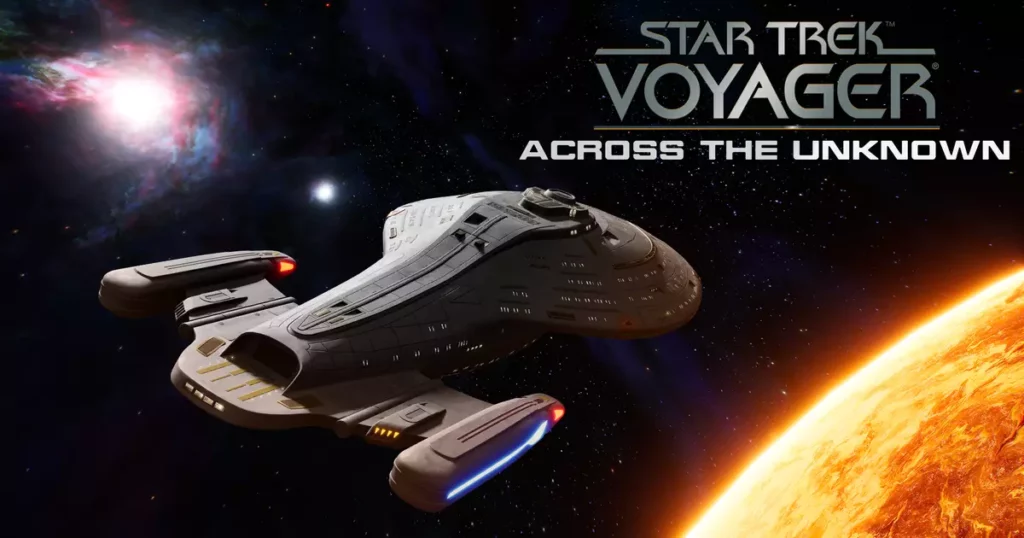The announcement of Star Trek: Voyager – Across the Unknown immediately sparks a visceral response among dedicated fans and skeptics alike. On one side, nostalgia pulses like a warp drive at full throttle; on the other, a cynic’s voice whispers concerns about the dilution of a storied franchise. Merging the venerable Voyager saga with a modern survival strategy game isn’t inherently a bad idea—it promises an interactive voyage where fans can finally step into Janeway’s boots and steer the ship through uncharted territory. Yet, this approach raises questions that cut deeper than mere gameplay mechanics: does such a game honor the narrative depth and ideological complexity that made Voyager relevant, or does it commodify a cherished universe into a collection of mechanics and meme-worthy scenarios?
It’s undeniable that the premise pushes for innovation—an experience where divine randomness and moral ambiguity come into play, mirroring the unpredictable nature of space exploration. Still, this obsession with “what-if” scenarios often devolves into shallow gimmickry rather than meaningful storytelling. The game’s heavy reliance on roguelite elements threatens to turn Voyager’s tragic humanism into a repetitive grind, stripping away the character development that elevated the show beyond a standard sci-fi adventure. Instead of truly reimagining Voyager’s soul, the risk lies in reducing its core to a series of randomized encounters, thereby undermining the gravity that distinguished its original narrative.
This Is Diversity That Might Sabotage Itself
One of the more intriguing features is the crew management aspect, where players choose between diplomacy and firepower, between research and reckless action. But in a franchise renowned for its insistence on moral complexity—the line between Federation idealism and pragmatic survival—reducing this to a gameplay choice can be damaging. It invites controversy: Should Janeway become the Borg Queen in some “what-if” fantasy? Would such a move be a daring narrative twist or a superficial stunt? This sort of gameplay risks trivializing the ethical dilemmas Voyager once wrestled with, turning profound questions into checkout-line entertainment.
Furthermore, the inclusion of a base-building system tied to a familiar XCOM-like interface risks glamorizing the strategic elements at the expense of storytelling. The game’s top-down, tactical perspective makes the universe feel sterile, distant, and somewhat infantilized—like miniature figurines inside a sandbox. This approach, while accessible, fails to capture the vastness and emotional weight of the Delta Quadrant’s mysteries. Instead of feeling like an epic that draws players into Voyager’s universe, it could become a parody or superficial doppelgänger that diminishes the show’s philosophical depth.
Can Nostalgia Serve as a Foundation—Or a Crutch?
The developer’s background further complicates expectations. A history rooted in Asterix comics rather than space simulation suggests a risky gamble—hoping that nostalgic familiarity will translate into critical success. Such an approach demands more than just names and settings; it requires a nuanced understanding of Voyager’s themes: resilience, moral compromise, and hope amid chaos. The game hints at “redefining” Voyager’s journey, but the real question is whether it can do so without cheapening the original’s ideological richness.
For many fans, this game might feel like a fever dream—a chance to force Janeway and Chakotay into a romance you never saw, or to see Seven of Nine’s synthetic resilience turned into a comic book hero’s overhaul. While this may appeal to a segment of fandom eager to indulge in fan fiction incarnate, it risks trivializing the mature storytelling that made Voyager a unique series. The haunting moments of sacrifice, the subtle critiques of authoritarianism, and the characters’ moral struggles are elements unlikely to survive such a superficial treatment.
In Summary: A Frightening Opportunity
What this game represents—if executed with fidelity—is a groundbreaking redefinition of interactive storytelling within a beloved sci-fi universe. But the perils are equally substantial. Nostalgia is a double-edged sword; it can inspire innovation or foster complacency. When franchise properties risk being reduced to gameplay mechanics and meme tropes, the core values they represent are often sacrificed on the altar of commercialism.
Whether Star Trek: Voyager – Across the Unknown will serve as an authentic homage or just another shallow cash-in depends heavily on the developers’ grasp of the franchise’s philosophical essence. For now, the promise teeters dangerously close to a dystopian future where beloved characters are reimagined as disposable assets, and moral complexity is replaced with routine procedural decision-making. Only time will tell whether this risks becoming a pioneering interactive experience or simply another relic of craven franchise opportunism.









Leave a Reply